Nuremberg: Woe to the Vanquished
Book Review
Nuremberg: The Last Battle, by David Irving. London: Focal Point, 1996. Hardcover. 380 pp. Photos. Source notes. Index. (Available for sale from the IHR for $39.95, plus shipping.)
Daniel W. Michaels is a Columbia University graduate As Jackson came to more fully understand the (Phi Beta Kappa, 1954), a Fulbright exchange student to Germany (1957), and recently retired from the US Department of Defense after 40 years of service.
This book is vintage Irving, bearing all the familiar hallmarks of the British historian’s skilled treatment of World War II: original research based on primary sources, vivid writing, and consideration for the German point of view, all with a defiant thumb to the nose to “court historians” and their “politically correct” adherents.
As he has amply demonstrated in his 30 published works of history, Irving is a master of excavating nuggets of historical gold from neglected archive files and ignored private diaries and letters. Because of his reputation as a scrupulous chronicler, numerous survivors of the Second World War era who are mistrustful (often with good reason) of establishment historians have, over the decades, entrusted him with their private papers.
In writing this “intimate look at the origins and conduct” of the 1945–1946 International Military Tribunal at Nuremberg, Irving has relied heavily on many hitherto neglected papers and documents, above all the official and private papers of Robert H. Jackson, a US Supreme Court Justice who served as the chief American prosecutor. Throughout this book, Irving shows considerable sympathy for Jackson, whom he portrays as an essentially decent man caught up in a tragic drama. “If this story needs a hero,” writes Irving, “then he is Jackson.”
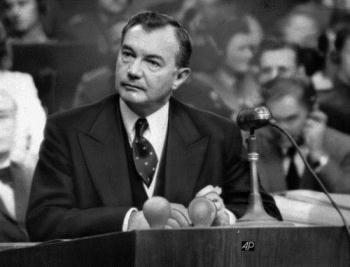
Robert H. Jackson, chief US prosecutor at Nuremberg, during his closing address to the Tribunal. He is the central figure of Irving's book.
As we learn, Jackson was initially enthusiastic about his important appointment, hoping to be the main architect of a new framework of international law. But even before the Tribunal’s opening session, he was arguing in Washington with his superiors, emphatically expressing his ethical and professional position:
If we want to shoot Germans as a matter of policy, let it be done as such, but don’t hide the deed behind a court. If you are determined to execute a man in any case, there is no occasion for a trial; the world yields no respect to courts that are merely organized to convict.
Early on, Irving relates, Jackson had a serious disagreement about his job with “Wild Bill” Donovan, head of the United States’ OSS intelligence service (predecessor to the CIA):
It soon became clear that the OSS had intended all along to manage the whole trial along the lines of an NKVD [Soviet] show-trial, with Jackson little more than a professional actor. As part of the stage-management, they proposed to run a pre-trial propaganda campaign in the United States, with “increasing emphasis on the publication of atrocity stories to keep the public in the proper frame of mind.” To this end the OSS devised and scripted for the education of the American public a two-reel film on war crimes, called Crime and Punishment; it was designed to put the case against the leading Nazis. Jackson declined to participate.
As Jackson came to more fully understand the nature of the role he was expected to play at Nuremberg, he became more troubled and dismayed. Confronted with the reality of the Nuremberg process, Irving shows, Jackson’s idealism subsided, but never entirely vanished.

The 21 defendants in the dock at the “International Military Tribunal,” which met at Nuremberg, November 1945-0ctober 1946.
High-Level Decisions
As Germany’s defeat became more obvious, the Allied leaders began discussing more specifically how to deal with the vanquished nation and its leadership. President Roosevelt, Prime Minister Churchill and Premier Stalin readily agreed that many prominent German leaders would be put to death, and that Germany itself would be so crippled industrially that it would never again be a major European economic and military power. “We have got to be tough with Germany,” said President Roosevelt, “and I mean the German people, not just the Nazis. You either have to castrate the German people or you have got to treat them in such a manner so they can’t go on reproducing people who want to continue the way they have in the past.”
Because the Allies had already publicly branded the German leaders as criminals, the discussions focused on whether they should be executed straight-away or after a public trial of some sort. Roosevelt and Churchill initially favored simply shooting most of Germany’s military and political leaders outright as they were found or surrendered. (This is what happened to Italy’s Duce, Benito Mussolini, who was simply murdered, along with his entourage.) It was Stalin who, mindful of his success in destroying rivals with the help of elaborate show trials, insisted that the German leaders be put on trial. Roosevelt and Churchill fell in line. Considering the adulation accorded the Nuremberg Tribunal by many in the United States and Britain today, it is strange (Irving notes) that it might never have come into being if the Soviet dictator had not insisted on it.
Not surprisingly, Soviet officials were under no illusions about the real nature and purpose of the Nuremberg proceedings. The Tribunal’s Soviet judge, Ion T. Nikitchenko, candidly summed up his government’s view of the proceedings: “We are dealing here with the chief war criminals who have already been convicted and whose conviction has already been announced by the heads of the governments.” He objected to the “fiction” that the Tribunal was objective, explaining that the judges’ job was merely to decide the appropriate punishment, and the prosecutors’ simply to assist the judges.
Double Standard
As Irving shows, the victorious Allies who sat in judgment at Nuremberg were guilty of many of the same actions or crimes for which they tried (and hanged) the German defendants. Indeed, the Allies very probably outdid the Germans in crimes and atrocities.
Irving cites, for example, the British-American fire bombings of Dresden, Hamburg and other German cities, killing tens of thousands of civilians at a time, the “ethnic cleansing” mass expulsion of German civilians from eastern and central Europe, of whom some two million perished or were killed, the widespread summary shootings of German prisoners, and the Allies’ use of hundreds of thousands of German prisoners as slave laborers. He also cites such lesser-known incidents as the sinking by British aircraft during the war’s final days of a clearly marked German Red Cross refugee ship, the Cap Arcona, killing 7,300 refugees, mostly women and children.
At the Yalta conference in February 1945, Roosevelt, Churchill and Stalin agreed to use millions of German POWs and German civilians as slave labor in Soviet Russia, France, and Belgium as partial “reparations in kind.” Jackson was shocked to learn that the Soviets wanted five million of these forced laborers, and France two million. (No final accounting has ever been made of the total number deported to the USSR for this purpose, or of the number who ever returned.) President Roosevelt endorsed this policy, which was in blatant violation of international law, concerned only about the possibly negative impact on public opinion and election prospects back home.
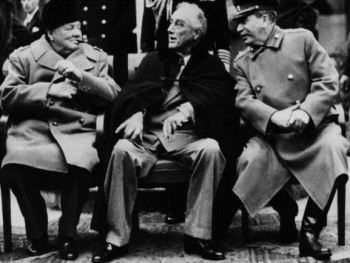
Franklin Roosevelt, Winston Churchill and Joseph Stalin, meeting at the Yalta conference in February 1945, laid down the broad outlines of postwar Allied occupation policy for Germany.
In some cases, the Nuremberg defendants were charged with or held guilty of crimes that were actually committed by the Allies. Most noteworthy, perhaps, is the massacre, at Katyn and elsewhere, of some 11,000–15,000 Polish officers and intellectuals. At Nuremberg Soviet prosecutors presented seemingly persuasive evidence of German responsibility for this crime, and several Germans whom a Soviet court had found guilty of these killings were publicly hanged in Leningrad. It was only decades later that Soviet officials formally acknowledged that the massacre had been carried out by the Soviet secret police, acting on Stalin’s orders.
Predictably, the Allies grandly exploited the Tribunal for propaganda purposes. As Irving relates, the Americans forced the defendants to watch US-made “documentary” films of German atrocities that deceitfully included scenes of corpses filmed in the wake of Allied air raids on German cities and factories. Some of the German viewers spotted the deception, and one former Messerschmitt worker said he even recognized himself in the film.
Unprecedented Legal Procedures
In these unprecedented proceedings, the Allies discarded basic principles of Western jurisprudence, perhaps most notably the well-established principle that in the absence of a law there can be neither crime nor punishment – nullum crimen sine lege, nulla poene sine lege. Instead, the Tribunal established new laws for the occasion, which were applied not only retroactively, but uniquely and exclusively to the German defendants. The Allies thus refused to consider the German defense argument of tu quoque or “you too” – that is, punishing the German defendants for actions that the Allies themselves also carried out.
The Tribunal rejected defendants’ pleas of obeying higher orders, even though, as Irving points out, precisely this had been affirmed as a valid defense under both British and American military law. Article 347 of the American Rules of Land Warfare, for example, specifically declares: “Members of the armed forces are not punished for these crimes, provided they were committed on the orders or with the permission of their governments or commanders.”
The Tribunal’s procedures, which were a blend of Allied procedures, differed markedly from German practice. In Germany, as in most of continental Europe, the court’s primary objective is to ascertain the truth. However, the Nuremberg Tribunal adopted a version of the American confrontational system, in which each side introduces only the evidence that benefits its own case. But because the Allies had confiscated all pertinent German documents and records, and refused access to them by the defense attorneys, the prosecution had a tremendous advantage over the German defendants.
‘Semitism Gone Wild’
With President Roosevelt’s approval, high-ranking Washington officials of Jewish origin played a major role in setting America’s policy on the postwar occupation of Germany, including the Nuremberg Tribunal. These included Isadore Lubin, Samuel Rosenman, Murray Bernays, and Herbert Wechsler. Above all, the malevolent role played by Henry Morgenthau, Jr., US Treasury Secretary and Roosevelt’s trusted adviser, insured that the spirit of the Talmud and the Old Testament would prevail.
As Irving shows, at least some Allied figures involved with the Nuremberg proceedings were honorable men who were dismayed by the heavy spirit of revenge. Some American and British officials were repelled by the general tenor of American and Soviet occupation policy toward defeated Germany. No less a figure than US Secretary of War Henry Stimson expressed concern:
I found around me, particularly in Morgenthau, a very bitter atmosphere of personal resentment against the entire German people without regard to individual guilt, and I am very much afraid that it will result in our taking mass vengeance on the part of our people …
On another occasion Stimson said:
I cannot believe that he [Roosevelt] will follow Morgenthau’s views. If he does, it will certainly be a disaster… The President appoints a committee and then goes off to Quebec with the man [Morgenthau] who really represents the minority and is so biased by his Semitic grievances that he is really a very dangerous advisor …
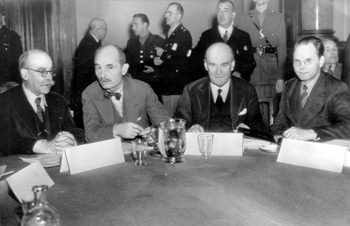
The Nuremberg Tribunal judges (left to right): Henri Donnedieu de Vabres (France), Francis Biddle (USA), Geoffrey Lawrence (Britain), and I.T. Nikitchenko (Soviet Union).
On still another occasion, Stimson confided: “I have yet to meet a man who is not horrified with the ‘Carthaginian’ attitude of the Treasury [Morgenthau]. It is Semitism gone wild for vengeance…” Britain’s Anthony Eden had much the same opinion of Morgenthau and his Jewish circle: “These ex-Germans seem to wish to wash away their ancestry in a bath of hate.”
In addition, Irving relates, officials of “several powerful Jewish organizations” intervened in the Nuremberg process. A few days before leaving for London in June 1945, Robert Jackson met in New York with Judge Nathan Perlman, Dr. Jacob Robinson, and Dr. Alexander Kohanski, who made quite clear their intention to play an important role in running the trial. (See also: M. Weber, “The Nuremberg Trials and the Holocaust,” Summer 1992 Journal, pp. 170–171.)
It was at this meeting that Robinson, an official of the World Jewish Congress, told Jackson that six million Jews had been lost during the war, and that he had arrived at this figure “by extrapolation.” As Irving tartly comments, “in other words his figure was somewhere between a hopeful estimate and an educated guess.”
As it happens, this same six million figure, Irving notes, had been cited 26 years earlier in a leading Jewish-American periodical. In a 1919 essay by a former Governor of New York state, readers were told that “six million” Jews “are dying” in a “threatened holocaust of human life” as victims of “the awful tyranny of war and a bigoted lust for Jewish blood.” (Facsimile in the Nov.–Dec. 1995 Journal, p. 31.)
Grave Misgivings
Responsible Allied military leaders disapproved of the postwar trials, especially of their counterparts in the German armed forces. Many American combat officers ardently opposed the prosecution of soldiers for obeying harsh orders issued by politicians. (See: H.K. Thompson and H. Strutz, eds., Doenitz at Nuremberg: A Reappraisal [IHR, 1983].)
In occupied Germany, American officers disliked having to enforce the vengeful Morgenthau directive 1067, and condemned as un-American the “so-called Gestapo methods used in handling Germans” that were being employed by (Jewish) refugees who had hurriedly been drafted into the US Army.
A few high-ranking British and American officers even spoke out on behalf of their German counterparts. For example, US Pacific Fleet commander Admiral Chester Nimitz issued a statement on behalf of Nuremberg defendant Admiral Karl Dönitz, who headed Germany’s wartime U-boat fleet, confirming that American submarines had operated in the Pacific just as German submarines had operated under Dönitz’ command in the Atlantic.
Francis Biddle, the Tribunal’s senior American judge, was moved to conclude that “the Germans fought a much cleaner war at sea than we did.” To his credit, Biddle also refused, in an important dissenting opinion, to sanction the handing over of Russian prisoners to the Soviets. (Regrettably, though, both British and American forces did so anyway in such transfers as the infamous “Operation Keelhaul.”)
Harlan F. Stone, Chief Justice of the US Supreme Court, was outspoken in his criticism of the proceedings. While he admitted that he would not be disturbed if the victors put the vanquished to the sword as was customary in days of old, Stone said he was disturbed to have the action dressed up in “the habiliments of common law.”
Fraudulent and Suppressed Evidence
As Irving shows, some of the evidence presented by the Allies to the Tribunal was fraudulent. This includes the widely-quoted report of a speech by Hitler to his generals on August 22, 1939, Nuremberg document 003-L, which Irving refers to as a “now notorious forgery.”
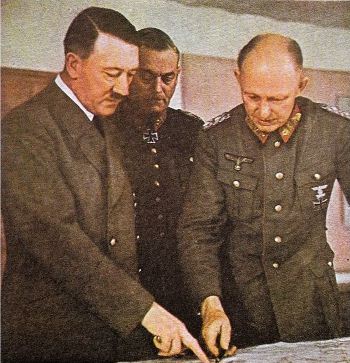
Hitler confers with General Alfred Jodl during a wartime military briefing. Observing the discussion is Field Marshal Wilhelm Keitel, Chief of the Armed Forces High Command. Jodl and Keitel were sentenced to death by the Nuremberg Tribunal, and hanged on October 16, 1946. Jodl was later posthumously exonerated by a German court, which cited the view of the Tribunal's French judge that his conviction had been unjustified.
No testimony had a more profound impact on everyone, including the defendants, than the “confession” of former Auschwitz commandant Rudolf Höss. As Irving shows, this widely-quoted statement, which was extracted after “three days of torture” by British military men, “contained numerous perhaps deliberate errors.” Höss had attempted to smuggle out of prison a letter to his wife in which he apologized for “confessing” to horrible atrocities at Auschwitz, relating that he had been tortured into making spurious admissions. The letter was seized by prison officials and never delivered, and is now in private hands in the United States.
The “protocol” of the January 1942 Wannsee conference, Irving writes, has been given “a wholly undeserved reputation as a key document in the Final Solution of the Jewish Problem.” As he points out, it “contains no explicit reference to the killing of Jews,” and Irving casts doubt on its authenticity.
A key German document on this matter, Irving notes, was suppressed for decades. This is a spring 1942 memorandum by Justice Ministry Staatssekretär Franz Schlegelberger recording that Dr. Hans Lammers, chief of the Reich chancellery, had informed him that Hitler had “repeatedly” ordered the solution of the Jewish problem “postponed until after the war.”
On the basis of bogus evidence, Irving relates, a number of familiar Holocaust horrors were supposedly proven at Nuremberg, including gassings at Dachau, steaming of Jews at Treblinka, and manufacturing of soap from human bodies.
As Irving reports, important documentary evidence, including the private papers and diaries of Heinrich Himmler and Hermann Göring, were looted by Allied troops and have disappeared.
Unjust Selection Standards
The Allies were never able to decide just who should be put on trial, or on what basis. As Irving repeatedly points out, at least several of the defendants should not have been in the dock at all. This was particularly true of the military men – Göring, Jodl, Keitel, Dönitz and Raeder. As prisoners of war, they were supposedly protected by the provisions of the Geneva Convention, which prohibited such trials. To get around this awkward legalism, the Tribunal arranged for these defendants to be technically “discharged” from the (no longer existing) German armed forces so they could “legally” be put on trial. After being “discharged,” their military ranks were obliterated. Even their medals (from both world wars) were taken from them and, after removing any precious stones or metals, destroyed.
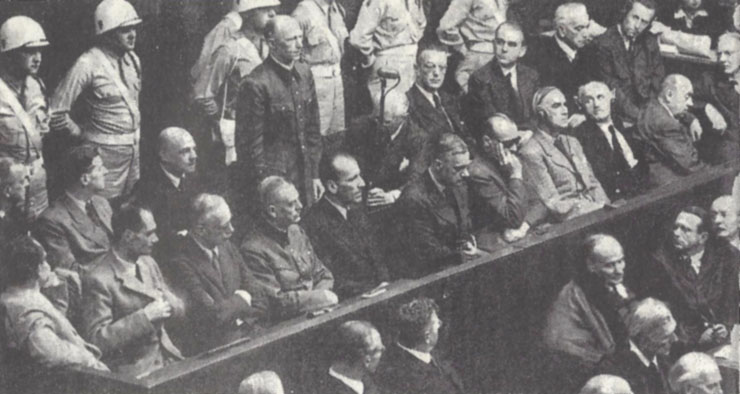
Standing among the other Nuremberg defendants, Alfred Jodl delivers his final plea to the Tribunal. “Later historians will arrive at a just and objective verdict” concerning the wartime conduct of the German armed forces, he said. Even US prosecutor Jackson respected JodI as an honorable professional soldier.
General Alfred Jodl, whom nearly everyone recognized as an honorable professional soldier, had not even met Hitler until 1939. (Jackson “privately felt the greatest respect for Jodl,” Irving relates.) In fact, Jodl was later posthumously exonerated by a German court, which cited the view of the Tribunal’s French judge, Henri Donnedieu de Vabres, that Jodl’s conviction had been without merit and a miscarriage of justice.
On what legitimate grounds could Rudolf Hess, Irving queries, be accused of war crimes? He played no role in determining Germany’s war aims or occupation policies. Indeed, in carrying out his ill-fated “peace flight” to Britain in May 1941, he was “the only man to have undertaken, at risk to his own life, a step to end the madness of war.” All the same, the Allied judges sentenced this humane and peace-loving man to life imprisonment. (He died, under mysterious circumstances by strangulation, in Berlin’s Spandau prison in 1987. His son, Wolf Hess, says he was murdered. See: “The Life and Death of My Father Rudolf Hess,” and “The Legacy of Rudolf Hess,” both in the Jan.–Feb. 1993 Journal.)
Hans Fritzsche, a German propaganda ministry department chief and wartime radio commentator, was on trial only as a stand-in for Goebbels, and because he happened to be the most important German prisoner in Soviet hands.
Göring’s Spirited Defense
Hermann Göring, once the second most powerful man in Germany, put up the most spirited and memorable defense. This was especially apparent in a remarkable back and forth confrontation over several days with Robert Jackson. “Everything had gone pretty well with the trial until Göring took the witness stand,” the American prosecutor himself privately remarked.
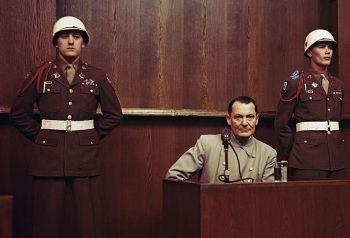
Hermann Göring astonished everyone with the mastery and verve he showed at Nuremberg in defending himself and the Third Reich's record.
Norman Birkett, one of the British judges, commented that Göring was dominating the entire proceedings, and that no one seemed to have been quite prepared for the former Reichsmarschall’s immense ability and knowledge, or for his mastery of the captured documents. Of Göring’s bravura performance, Birkett wrote:
The cross examination had not proceeded more than ten minutes before it was seen that he was the complete master of Mr. Justice Jackson. Suave, shrewd, adroit, capable, resourceful, he quickly saw the elements of the situation, and as his confidence grew, his mastery became more apparent … For almost two days he held the stage without interruption of any kind.
Allied journalists were speechless, having believed their own stories that Göring was a dope fiend, a physical wreck and a neurotic.
When at one point an American official murmured something to Göring about Germany’s aggressive wars of conquest, the Reichsmarschall shot back:
Don’t make me laugh. America, England and Russia have all done the same thing to promote their own national aspirations, but when Germany does it becomes a crime – because we lost.
Even after the judges had sentenced him to death, Göring delivered a final embarrassing slap to the Tribunal by taking his own life, denying the victors the pleasure of hanging him.
Streicher’s Anti-Jewish Fervor
At the other end of the sophistication scale, defendant Julius Streicher, notorious for his anti-Jewish weekly, Der Stürmer, was certain from the outset that the trial was a “triumph of world Jewry,” and that “the Jews will make sure enough that we hang.” As Irving explains, Streicher was convinced
that “the Jews” were making it their objective to establish final supremacy over the gentile races by ramming multiculturalism and multiracism down their throats. He had campaigned, in response, for the destruction of the Jews, and that no doubt was why he now found himself here.
When Streicher tried to protest from the witness stand the beatings he had received at the hands of his American captors, Jackson had the remarks stricken from the official record.
The Tribunal’s proceedings confirmed everything he had ever believed or taught about the Jews. In Streicher’s view:
In this trial there is no question of according to the defendant a blind and impartial justice; the trial has been set the task of giving to an injustice a veneer of legality by cloaking it in the language of the law.
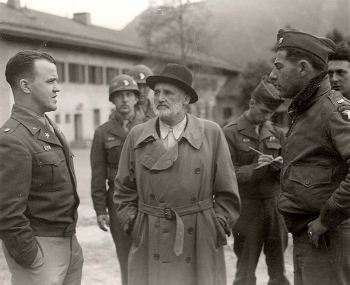
Julius Streicher with US Army Major Henry Plitt [right] (who was Jewish), shortly after his capture in May 1945. Streicher was brutally beaten and mistreated by his American captors. The Nuremberg Tribunal, which he called a “triumph of world Jewry,” sentenced him to death for writings that appeared in his stridently anti-Jewish weekly paper “Der Stürmer.”
Mistreatment
Irving details the maltreatment and tortures inflicted on the defendants by their American and British captors, including a near-starvation diet imposed during the Tribunal’s proceedings. The defendants’ wives were also arrested and thrown into prison – and separated from their children, who were put in orphanages.
Even worse was the treatment of defendants in the American-run post-Nuremberg trials. Thus, the US Army war crimes trials at Dachau “were a mockery of the law,” writes Irving, at which “defendants and witnesses there were savagely beaten or intimidated to make them sign false confessions.”
(See also Joseph Halow’s Innocent at Dachau, available from the IHR for $16.50, postpaid. [Check www.ihr.org for current availability and price; ed.])
Tests conducted by an American psychologist showed that the Nuremberg defendants were of above average intelligence. Several had IQ levels in the genius range: Schacht 143, Seyss-Inquart 141, Göring 141, and Dönitz 138. (A single exception was Streicher, whose 106 IQ was in the normal range.)
To help illustrate the defendants’ character and personalities, Irving quotes from letters written by them to their loved ones from their prison cells. For example, Irving cites a passage from a letter Jodl wrote to his wife two days before his hanging:
It is already late and the lights are soon going out. When our friends come round to see you on the evening after my death, that shall be my funeral parade. On a gun-carriage rests my coffin and all the German soldiers are marching with me – with those who have died in battle out in front and the still living bringing up the rear.
Each of the condemned went to the gallows calmly, bravely, and with as much dignity as possible under the circumstances. Their last words were expressions of love for Germany and for international reconciliation. Because the Nuremberg hangman botched his grim job, the Tribunal’s sentence of death by hanging amounted, in practice, to strangulation.
In one of the several final notes penned just before his death, Göring wrote:
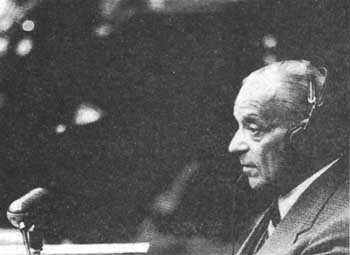
Franz Schlegelberger, a high-ranking Justice Ministry official, testifies at Nuremberg. In a confidential spring 1942 memorandum, which was suppressed for decades, he wrote that Hans Lammers, chief of the Reich chancellery, had informed him that “the Führer has repeatedly told him [Lammers] that he wishes the solution of the Jewish question postponed until after the war.”
To the Allied Control Council:
I would have let you shoot me without further ado! But it is not possible to hang the German Reichsmarschall! I cannot permit this, for Germany’s sake. Besides I have no moral obligation to submit to the justice of my enemies. I have therefore chosen the manner of death of the great Hannibal…
It was clear from the outset that a death sentence would be pronounced against me, as I have always regarded the trial as a political act by the victors, but I wanted to see this trial through for my people’s sake, and I did at least expect not to be denied a soldier’s death. Before God, my country, and my conscience I feel myself free of the blame that an enemy tribunal has attached to me.
‘Fair’ Trial or ‘Victors Justice’
This book’s central protagonist, Robert Jackson, finished the trial convinced, Irving believes, that all in all it had been fair. Considering the political pressures, the ethnic hatreds, the legacy of millions of war dead, and the vengeful the spirit of the times, the American prosecutor probably did the best he could.
Irving himself, perhaps identifying and sympathizing with Jackson, avoids any condemnation of the Tribunal as such. Indeed, citing such Third Reich misdeeds as “the killings after the Röhm putsch, the widespread liquidation of political enemies or racial groups, [and] the murder of enemy prisoners of war,” he expresses the view that “in most cases, the basic justice of the sentences passed at Nuremberg was undeniable.” Irving believes that in many cases German courts would have dealt more severely with the defendants than did the Nuremberg judges.
In this reviewer’s opinion, though, Nuremberg was – however honorable the intentions of such participants as Robert Jackson and Henri Donnedieu de Vabres – a hypocritical undertaking that failed in its great stated goal of establishing a lasting and impartial framework of new international law. This failure was tragically inherent in the Tribunal’s origins and makeup. As Jackson himself declared at one point during the proceedings, “this Tribunal is a continuation of the war effort of the Allied nations.”
Furthermore (and as Irving mentions), the “International Military Tribunal” was neither truly international nor even military. Its judges, as well as its prosecutors, were chosen by the four main victorious Allied powers. It could have succeeded only if its judges had been chosen from non-belligerent (neutral) states. Moreover, it would have required impartial rules of procedure, including equal access to evidence, humane treatment of the defendants, and the Allies being held to the same standards they applied to the German defendants.
The leaders of the three main Allied countries – Roosevelt, Stalin and Churchill – settled on this judicial facade to justify an unprecedented act of political vengeance. Because it was, in essence, victors’ justice, inevitably its most telling lesson, therefore, was vae victis – woe to the vanquished.
Having thoroughly demonized the enemy through wartime propaganda, and having attributed all war guilt and crimes to him, the victorious Allies felt comfortable demonstrating their own righteousness to the world by executing the evil-doers. As Chronicles editor Thomas Fleming wrote (in the June 1997 issue), at Nuremberg “the Allies institutionalized the hypocrisy of their own propaganda.”
Still Defiant
Irving tells the story of the Nuremberg Tribunal with great style and verve, painting a broad and vivid portrait. He does so, moreover, sine ira et studio – without anger or partiality. Adding to the impact and immediacy of this handsome hardcover volume are more than 70 photographs, many in full color, and an attractive four-color dust jacket.
Because Irving is one of the few Western historians who has tried to give due consideration to the German view of 20th- century history, he is often unfairly dismissed as a “Nazi apologist” by those who are eager to castigate the Third Reich and its leadership as evil, and who insist that, therefore, there is no “other side” seriously to consider. Americans especially find it difficult to believe that an enemy in war could possible have a just cause, believing (as our politicians remind us) that America always occupies the moral high ground. As any open-minded reader of this book must conclude, though, the German defendants had valid if not compelling arguments to make for their actions.
Reading this book, one can dismiss fears that Irving has somehow “given up.” If Nuremberg: The Last Battle is any indication, the gutsy British historian has lost none of his familiar determination or fire. Even if he must keep struggling to keep a few steps ahead of the thought-control police, he seems as dedicated as ever to defying his critics and discomforting the enforcers of the prevailing Zeitgeist with his provocative and enduring historical chronicles.
Alfred Jodl's Final Statement to the Nuremberg Tribunal
Mr. President,
May it pleased the Tribunal, it is my unshakable belief that later historians will arrive at a just and objective verdict concerning the higher military leaders and their assistants, for they and the entire German armed forces with them, were confronted with an insoluble task, namely, to conduct a war which they had not wanted under a commander-in-chief [Hitler] whose confidence they did not possess and whom they themselves only trusted within limits; with methods that frequently were in contradiction to their principles of leadership and their traditional, proved opinions; with troops and police forces that did not come under their full command; and with an intelligence service that in part was working for the enemy. And all this in the complete and clear realization that this war would decide the life or death of their beloved fatherland. They did not serve the powers of Hell and they did not serve a criminal, but rather their people and their fatherland.
As far as I am concerned, I believe that no man can do more than to try to reach the highest of the goals that appear attainable to him. That and nothing else has always been the guiding principle for my actions, and for that reason, Gentlemen of the Tribunal, no matter what verdict you may pass upon me, I shall leave this courtroom with my head held as high as when I entered it many months ago.
But whoever calls me a traitor to the honorable tradition of the German Army, or whoever asserts that I remained at my post for personal and egotistical reasons, him I shall call a traitor to the truth. In a war such as this, in which hundreds of thousands of women and children were annihilated by layers of bombs or killed by low-flying aircraft, and in which partisans used every – yes, every – single means of violence that seemed expedient, harsh measures, even though they may appear questionable from the standpoint of international law, are not a crime in morality or in conscience.
For I believe and avow that a man's duty toward his people and fatherland stands above every other. To carry out this duty was for me an honor, and the highest law.
May this duty be supplanted in some happier future by an even higher one, by the duty toward humanity.
“All things now held to be old were once new … What today we hold up by example, will rank hereafter as precedent.”
—Tacitus, Roman historian
Bibliographic information about this document: The Journal of Historical Review, vol. 17, no. 1 (January/February 1998), pp. 38-46
Other contributors to this document: n/a
Editor’s comments: n/a
